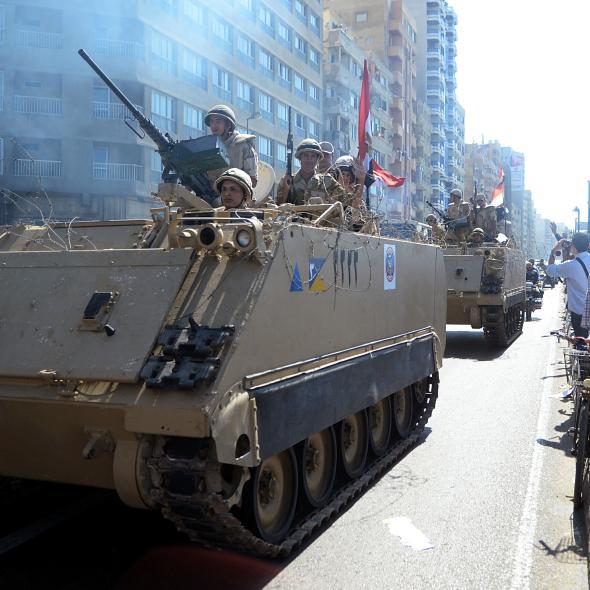The New York Times reports on a likely forthcoming announcement that the U.S. will be suspending part of its aid to the Egyptian government:
The decision, which is expected to be announced in the coming days, will hold up the delivery of several types of military hardware to the Egyptian military, these officials said, including tanks, helicopters and fighter jets. But it will not affect aid for counterterrorism operations or for border security issues involving the Sinai Peninsula and Gaza.
The administration’s move follows a lengthy review that began in August after days of bloody attacks on supporters of Egypt’s ousted president, Mohamed Morsi, which left hundreds of people dead. The administration had already frozen the shipment of four F-16 fighter jets and canceled joint military exercises with the Egyptian Army.
The United States will also suspend nonmilitary aid that flows directly to the government, but not support for other activities like education or hospitals, the officials said.
Officials tell the Washington Post that “the primary focus will be a hold on the shipment of a dozen AH-64D Apache helicopters from an order placed four years ago.”
The move comes amid a harsh crackdown by the Egyptian military, three months after the coup that brought down Morsi—though of course U.S. officials still won’t be using the c-word to describe events in Egypt, which would entail a full cut-off of aid according to U.S. law. The cut is certainly likely to be less than what some members of President Obama’s national security team have been pushing for.
The White House had already requested $1.55 billion in total assistance for Egypt–$1.3 billion in military aid and $250 million in economic aid–before the rview began. When the announcement does come, and officials are suggesting it could still be postponed, the dollar figure is likely to matter less than the actual hardware being cut.
Yes, U.S. financial support is symbolically important to Egypt: it has historically received the second most U.S. aid after Israel, though Afghanistan, Pakistan, and Iraq now receive more on a year-to-year basis. But the U.S. has already been eclipsed as the Egyptian government’s primary patron, a fact underlined by Interim President Adly Mansour’s just concluded trip to Saudi Arabia.
Saudi Arabia has already pledged $5 billion in grants and loans to Egypt’s government, with the United Arab Emirates kicking in $3 billion. Saudi Arabia has also promised to compensate Egypt for any aid Western countries might withdraw as a result of the government’s crackdown on supporters of the Muslim Brotherhood.
So, the money will keep flowing into Cairo’s coffers, but as Eric Schmitt of the New York Times reported in August, the U.S. does still have leverage thanks to the Egyptian’s military penchant for American battle tanks, attack helicopters and fighter jets, which require continuing shipments of American-made parts to operate:
Even if Saudi Arabia and other Persian Gulf monarchies make up for any aid the United States may suspend, Washington would block Egypt from buying American weaponry with that money — a serious long-term problem for a military that is already viewed as sclerotic and has neglected pilot training so badly that the Egyptian air force has one of the worst crash rates of any F-16 fleet in the world.
What Egypt’s generals fear most is the cutoff of hundreds of millions of dollars in mundane but essential maintenance contracts that keep the tanks, fighter jets and helicopters running, American officials and lawmakers said. In the past, maintenance costs have represented roughly 15 percent of total American military aid to Egypt, according to the Government Accountability Office.
So while this isn’t the full aid cut-off that some were hoping for, and it monetary terms it’s not going to make a huge impact, the White House does have the ability to inflict some discomfort on Egypt’s generals if it wants to.
With the Saudi government already irked by the U.S. government’s reluctance to fund rebels in Syria, tentative steps toward rapprochement with Iran, and lack of support for the crackdown on the Muslim Brotherhood, it should also be interesting to watch the reaction to this latest development from Riyadh.
